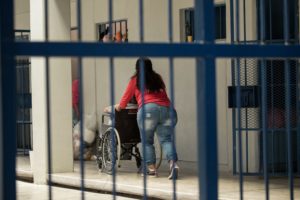December's "Enabling Law" – which grants President Hugo Chávez far-reaching decree powers for 18 months – constitutes an illegitimate infringement on the new National Assembly's authority, subverting the will of the electorate.
President Chávez's recent offer to limit the term of the law to five months is a positive step. But the underlying problems with the law remain, whether it is in force for 18 months, five months, or one day.
The "Law for the Defense of Political Sovereignty and National Self-Determination," also passed in December, prohibits "organizations that defend political rights" from receiving international funding, in violation of Venezuela's own Constitution and international human rights commitments.
On December 17, just days before adjourning its final session, Venezuela's outgoing National Assembly granted President Hugo Chávez the authority to legislate by decree until June 2012. The expiring legislature was composed almost entirely of pro-government deputies, thanks largely to opposition leaders' boycott of the 2005 elections. By contrast, some 40 percent of the 165 members of the incoming Assembly – which was seated on January 5 – hail from opposition parties. The members of the new legislature were elected last September 26, when opposition candidates garnered more votes nationwide than did allies of President Chávez. Opposition gains in last September's elections denied President Chávez's United Socialist Party of Venezuela (PSUV) the supermajorities required to change the Constitution or to pass "enabling laws" in the new Assembly. By delegating far-reaching decree powers to President Chávez, the expiring Assembly significantly reduced the new legislature's autonomy and power, and undermined the will of the voters who participated in the September 26 elections.
President Chavez's recent proposal to limit the term of the law to five months shortens the time period during which he can wield decree power, but it does not limit his powers during that period. His offer does not address the illegitimacy of the law itself, in which one outgoing Assembly delegates the powers of the next incoming Assembly. Nor does it address the fact that the scope of this law far exceeds what is needed for the President to deal with the flood damage.
The rationale provided for such wide-ranging and long-term decree powers was to allow President Chávez to address the country's devastating floods. But, as noted earlier, the decree powers are granted in very broad terms that extend well beyond the problems created by the flooding, including finance and taxes, citizen security, national security and defense, and the "socio-economic system." To be sure, Venezuela's Constitution provides for enabling laws, and the legislature had granted decree powers to President Chávez on three previous occasions since he first took office in 1999. But in this case, one Assembly – on the verge of expiring – has significantly compromised its democratically elected successor Assembly by delegating substantial legislative authority to the executive.
Not only does this signify a further concentration of power in the hands of President Chávez, it frustrates the will of the voters themselves, violating a fundamental tenet of democracy enshrined in both the American Convention on Human Rights (Article 23) and the Universal Declaration of Human Rights (Article 21).
Of additional concern is the "Law for the Defense of Political Sovereignty and National Self-Determination" – also passed in late December by the outgoing National Assembly – which expressly prohibits civil-society organizations that "defend political rights" from receiving international funds, with severe fines as punishment. Governments can legitimately regulate non-governmental organizations (NGOs). This law, however, clearly violates the guarantees of peaceful freedom of association, political equality and participation that are specified in Venezuela's own Constitution (e.g., Article 62), as well as in the American Convention on Human Rights (e.g., Article 16) and the Universal Declaration of Human Rights (e.g., Article 20).
In recent years, the Venezuelan government has increasingly dismissed credible human rights concerns by categorizing them as threats to national sovereignty and instruments of an international campaign by hostile foreign powers. For obvious reasons – especially the U.S. government's history of intervening to undermine democratic governments in the hemisphere – the Venezuelan government's insistence that such criticisms are attacks on its sovereignty echoes favorably for many in Latin America. But the alarming December laws highlighted here violate Venezuela's own obligations in defense of democracy and human rights.
During Chávez's presidency, Venezuela has achieved notably greater inclusion and democratic participation of historically marginalized sectors of society. Not surprisingly, these shifts have generated tensions and sharp political conflicts in Venezuela. WOLA believes that democratic societies can, and must, handle such conflict and make progress toward social justice without sacrificing bedrock elements of democracy and human rights. Pluralism, tolerance, freedom of expression for all, separation of powers and the independence of the judiciary, and a vibrant civil society are all necessary components of a healthy democracy and sustainable economic justice.
WOLA calls on civil society and governments to respond to the worrisome laws recently passed in Venezuela in ways that protect and accompany the country's defenders of human rights, freedom of expression, and pluralistic democratic practice. Civil society and governments alike should continue to engage with Venezuela's government, but at the same time make clear that the country's retreat from fundamental democratic precepts has consequences for Venezuela's standing in the hemisphere's community of democracies.
In so doing, the international community should be mindful of the lessons of the U.S. government's failed policy towards Cuba: unilateral policies of total non-engagement do nothing to improve human rights or to promote democratization. Instead, they can make the situation worse, intensifying an already polarized climate.

